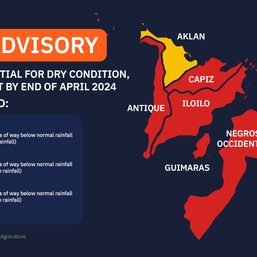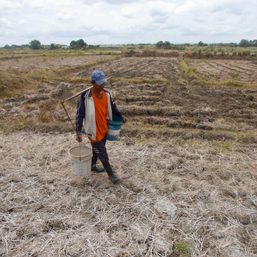SUMMARY
This is AI generated summarization, which may have errors. For context, always refer to the full article.

MANILA, Philippines – The Commission on Audit (COA) flagged the Department of Agriculture (DA) over a reported failure to distribute a total of 855,493 bags of rice seeds meant for farmers under the P10-billion Rice Competitiveness Enhancement Fund (RCEF). The Philippine Rice Research Institute, in response, clarified the COA’s report timing, accounting differences between the fiscal year reports of COA versus the cropping season reports.
The COA, in its latest annual audit report, also flagged the agency concurrently headed by President Ferdinand Marcos Jr. after it also failed to distribute 2,088 pieces of farm machinery. According to the state auditors, the non-distribution of the seeds and equipment deprived the farmers of their needed assistance. It was also against the objective of the Republic Act No. 11203 or the Rice Tariffication Law.
“Total availment of the program showed that 2,088 various farm equipment were not yet distributed out of the total 22,520 procured equipment,” the COA said.
A total of 14,192 bags of rice seeds were said to be damaged and were removed from storage to be used as animal feed. Meanwhile, 83,114 bags were donated to the Department of Social Welfare and Development and to the Bureau of Jail Management and Penology. The other 750,000 bags are being kept as inventory for the next cropping season, the agriculture department explained.
Meanwhile, on the farm equipment, state auditors added the machineries are also in danger of being inoperable due to improper storage. The equipment includes 942 hand tractors, 599 floating tillers, 329 reapers, and 215 recirculating dryers.
“The said farm equipment will further deteriorate due to exposure to heat and foreign elements as these were placed in an open space,” the COA explained.
As of April 16, 2023, around 488 of the farm machines remain undelivered with an assurance, according to the DA. The Philippine Center for Post-harvest Development and Mechanization promised full distribution would be accomplished by June 2023, the agriculture department added.
Philippine Rice Research Institute clarifies rice seeds issues
In a statement sent to Rappler on August 22, Dr. Flordeliza Bordey, deputy executive director of the Rice Competitiveness Enhancement Fund Program Management Office at PhilRice, clarified statements from the COA report, noting differences between data based on the timing of release of given reports based on the fiscal year and the cropping season.
“Fiscal year report ends in December, while seasonal report, especially for dry season, is released in March of the succeeding year. The timing difference will make it appear that there is huge remaining seed stock in December but these are actually being distributed until March within the same season,” she added.
According to data from the RCEF Rice Seed Monitoring System, 11,952,883 bags of certified seeds were distributed to the farmers since its maiden implementation on September 16, 2019 until March 15, 2023, covering 7 seasons of implementation, from the 2020 dry season to the recently concluded 2023 dry season.
“We have distributed most of the seeds with some remainder kept as reserve stock for distribution for early planters in the next cropping seasons, following the existing guidelines,” she explained.
Additionally, less than 1% of the total delivered seeds were reportedly damaged, and were repurposed for disposal or donation.
“Seeds are living organisms. Its viability as planting material is subject to exposure to environmental factors including changes in temperature and humidity, flooding, and infestation of storage-related pests like weevils, rodents, and birds,” Bordey added regarding damaged stock.
Bordey said the institute ensured proper documentation according to government auditing and accounting rules.
Names not present in fuel discount card master list
The COA also flagged the DA over the inclusion of 25,163 names in the master list of fuel discount cards, which are not part of the Bureau of Agricultural and Fisheries Engineering’s (BAFE) source list. Under the DA’s Memorandum Circular (MC) No. 29, series of 2022, farmers registered under the BAFE’s Agricultural and Biosystems Engineering Management Information System (ABEMIS) are priority for the fuel subsidy cards.
Meanwhile, DA’s MC No. 10, series of 2022, mandated that the names must be registered with ABEMIS. The system stores the names of corn farmers and fisherfolk, including agricultural machineries they use.
Each of the subsidy cards contain P3,000 one-time assistance that can be claimed by farmers in accredited fuel stations in the country. The master list was submitted to the Development Bank of the Philippines (DBP) for the issuance of e-wallets.
“Verification of corn farmer-beneficiaries listed in the master list submitted… for the issuance of fuel discount cards and the list of farmers listed in the ABEMIS disclosed that 25,161 farmers were not enrolled or listed… contrary to the above mentioned provisions,” the COA said.
According to the COA’s tally, there were 57,459 agricultural workers listed under ABEMIS. However, the number of beneficiaries swelled to 77,028 – a difference of 19,569 – based on the master list with the DBP. Of the 25,163 names that were not present in the master list, 7,813 were from Cagayan Valley, 7,189 from Ilocos Region, 3,422 from Bicol, 2,436 from Northern Mindanao, and 1,361 from Calabarzon.
In its explanation, the BAFE said the ABEMIS has yet to complete the listing of corn farmers provided by DA regional offices.
“The inclusion of the 25,161 corn farmers in the master list submitted to DBP for the issuance of fuel discount cards but not found in the ABEMIS file maintained by the BAFE casts doubt on the accuracy of the master list and whether said farmer-beneficiaries own farm machinery with attached engine that is being used for crop production,” the state auditors said.
The DA’s central office, in its comment, said some of the names in the master list were “onboarded even without the corresponding ABEMIS number,” instead of relying on the certification from the Municipal Agriculture Office to expedite the process of providing assistance.
However, the COA pointed out it was the DA that issued the guidelines under MCs 10 and 29, which required that machine or farm equipment must be registered with ABEMIS in order for the beneficiary to be included in the program.
Meanwhile, DA management agreed to the recommendation for a strict enforcement of the its own memorandum circular No. 10 series of 2022, which means beneficiaries to be included in the master list shall be sourced from the database of the ABEMIS. – Rappler.com
Add a comment
How does this make you feel?





There are no comments yet. Add your comment to start the conversation.